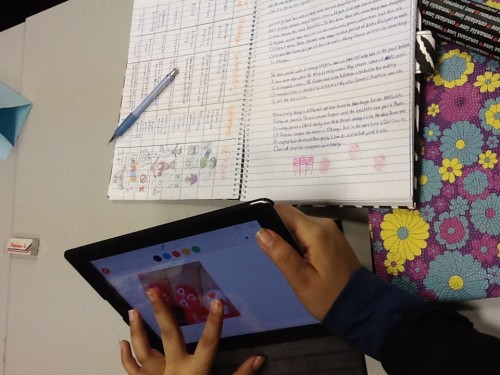Bridging the Gap: Using Vocabulary Apps to promote Academic Skill Development
Lark S. Escobar While we are in a technology-rich environment, not all teaching scenarios are as ideal as ours at HCT. In any classroom, learners may lack various skills or background, sometimes even to the extreme. In a previous position a few years ago, I was deployed to Afghanistan to address the issue of national literacy in both native languages and in English. My responsibilities included customizing plans for national education systems that bridged the gap between where Afghan learners were and where they needed to be to compete in the global economy. This was an interesting challenge due to the unique recent context of Afghanistan.
While we are in a technology-rich environment, not all teaching scenarios are as ideal as ours at HCT. In any classroom, learners may lack various skills or background, sometimes even to the extreme. In a previous position a few years ago, I was deployed to Afghanistan to address the issue of national literacy in both native languages and in English. My responsibilities included customizing plans for national education systems that bridged the gap between where Afghan learners were and where they needed to be to compete in the global economy. This was an interesting challenge due to the unique recent context of Afghanistan.
In Afghanistan, books and paper disappeared from common use due to restrictions under the Taliban. The absence of books and paper products meant these learners had not grown up with a culture of keeping notebooks, reading books, and writing in general. Not only was literacy dramatically diminished, but as families were suddenly impoverished, many began burning books to stay alive through snowy winter nights. When students enrolled in classes, they lacked the ability to manage papers. They would leave them behind, use them for other-than-intended purposes, or they would return with them rumpled beyond recognition. This example embodies what Dr. Payne identifies as the gaps between the skills students need to be academically successful, and what their culture (recent or not) dictates (2005). Students had to be explicitly taught how to manage paper and books in order to function fully in the classroom.
In addition, both learners experiencing situational poverty (a new status for the family) and generational poverty may be challenged with time management. They may not maintain regular routines and may experience continual instability in the home (2005). This may impact their study opportunities, particularly if they are responsible for the care of younger siblings. They may not have regular sleep, or sufficient nutrition to be ready for learning (2005).
The Emirati students we teach have a somewhat different daily context from the Afghans, but may still have gaps in academic skills. They are really proficient with using their iPads and smart phones, utilizing a broad range of apps to complete tasks for class. Still, they may struggle when it is time to show what they know on written assessments or later in their program areas when note taking, independent study skills, and non-app based learning are required. I’ve found that using some vocabulary apps helps students bridge the gap between the technology they are so excellent at using, and paper-based tasks which are more overwhelming and perhaps less familiar.
Students can practice using an app like Dictionary.com to help themselves grasp unfamiliar vocabulary they encounter. Instead of just checking the translation or the definition of a word, I like to have them index these new words in vocabulary charts in their notebook. This running list helps them organize and practice new words with the support of the Dictionary.com app, specifically the thesaurus feature. It provides a very short, learner’s definition and a ranked list of synonyms. This allows learners to see the meaning, link it to words that might be familiar, identify new vocabulary, and hear the pronunciation of the word all in one go. After they gain an understanding of the word, in their charts they practice using the word in a sentence and then make a picture to illustrate the meaning. These acts of reinforcing synthesis help learners apply the knowledge that they gain via the iPad app to developing study skills and language skills in tandem. This is one way to help students develop strategies for life-long learning and enjoy academic success.
The chart looks something like this on their notebook page:
| New Word | Meaning | Sentence | Synonym | Picture |
| Sophisticated (adj) | complex,advanced | The company has a sophisticated plan. | complicated | |
| Modern(adj) | new, up-to-date | The U.A.E. has a lot of modern technology now. | recent, current, now |
Reference:
*Payne, R. (2005). A framework for understanding poverty (4th rev. ed.). Highlands, Tex.: Aha! Process.